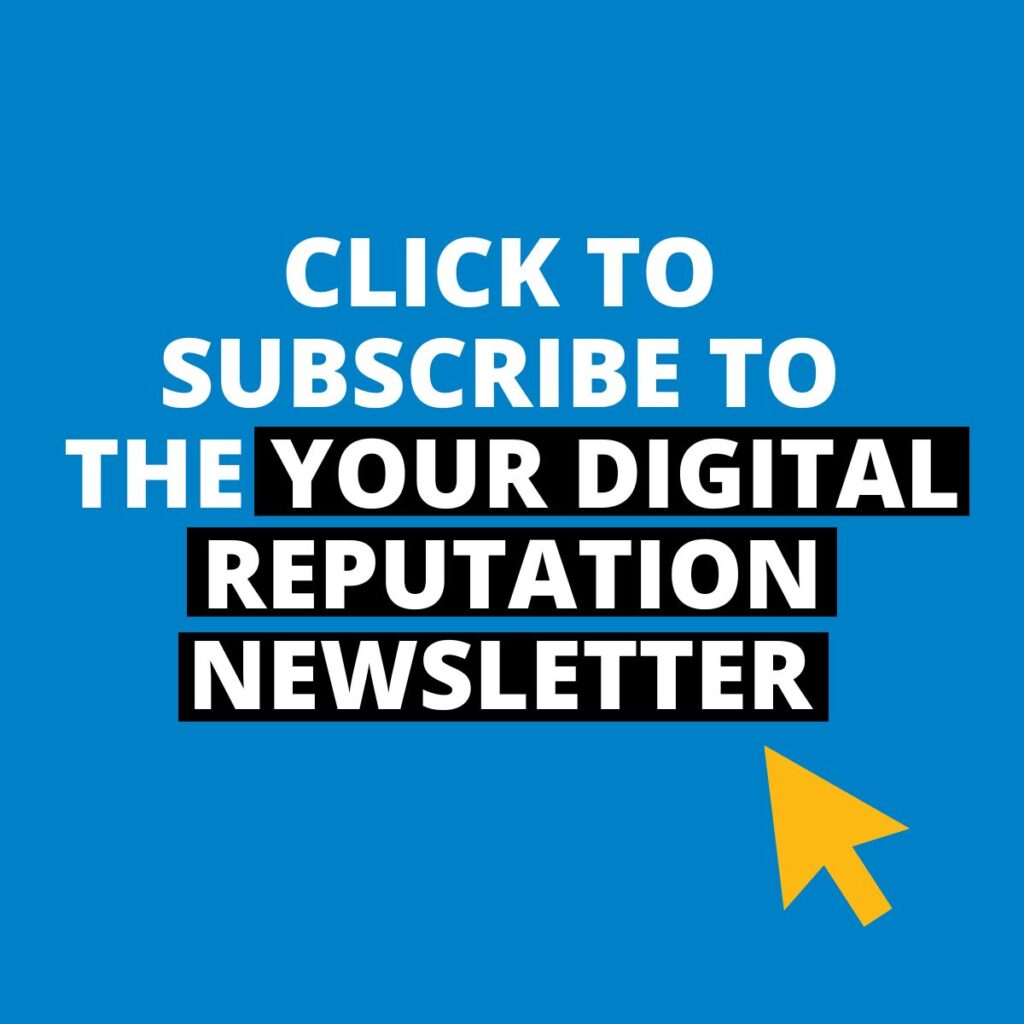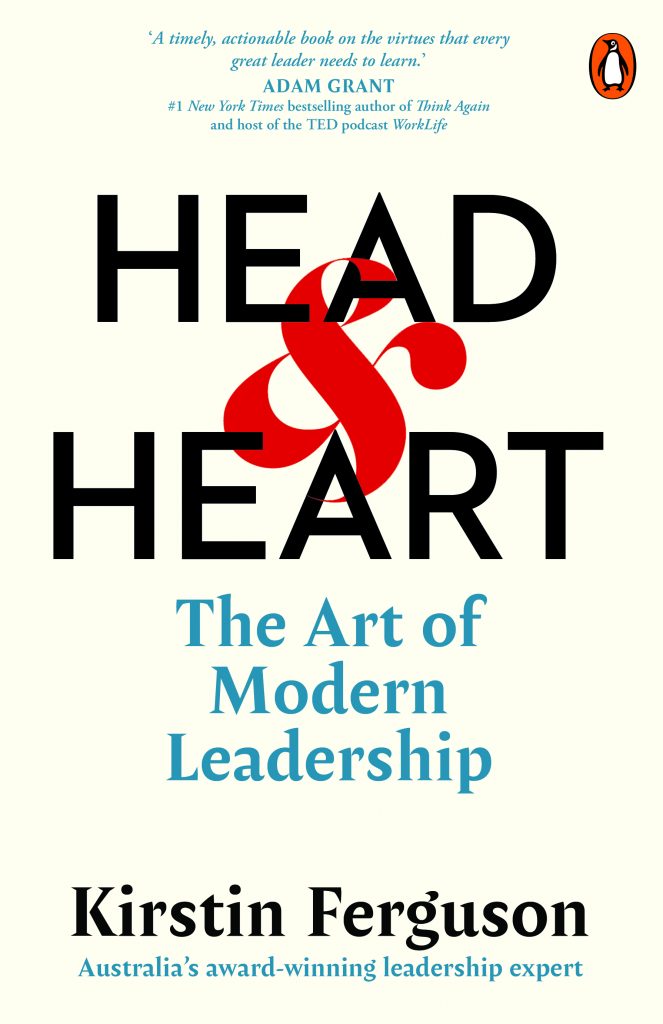In this episode, we’re asking: How can digital help leaders amplify their legacy? It’s a big question in the context of digital reputation, and one of the GREAT untapped opportunities across corporate Australia.
Our own ‘The Digital Reputation Report’ research into the LinkedIn efforts of the CEOs leading our largest listed organisations – the ASX200 – showed that almost 85% of CEOs were either invisible, inactive or ineffective on LinkedIn. 85%. What a huge opportunity to leave a legacy missed.
These digital communication platforms are such a rare opportunity for CEOs and others looking to share their voice and views. For anyone looking to amplify their own positive impact by going well beyond the four walls of their organisation to inspire and motivate key audiences online. When you talk about legacy and impact, which leader WOULDN’T want to harness that capability?
My guest on this episode knows this opportunity only too well. In a way, she is a living, breathing example of someone who amplifies good leadership online, AND someone who encourages other leaders to take up the opportunity themselves in her new book called, ‘Head & Heart – The Art of Modern Leadership’.
She’s been the CEO of a global consulting firm, a senior executive at a leading corporate law firm, and the former Acting Chair and Deputy Chair of the Australian Broadcasting Corporation (ABC). She’s also someone I’ve followed online and admired for her honest and authentic approach to the issues that matter to her: leadership, equality, diversity and inclusion. Dr Kirstin Ferguson AM – it was a joy to have you on the Your Digital Reputation podcast.
Here’s a snapshot from our discussion. I hope you find it as valuable and insightful as I did.
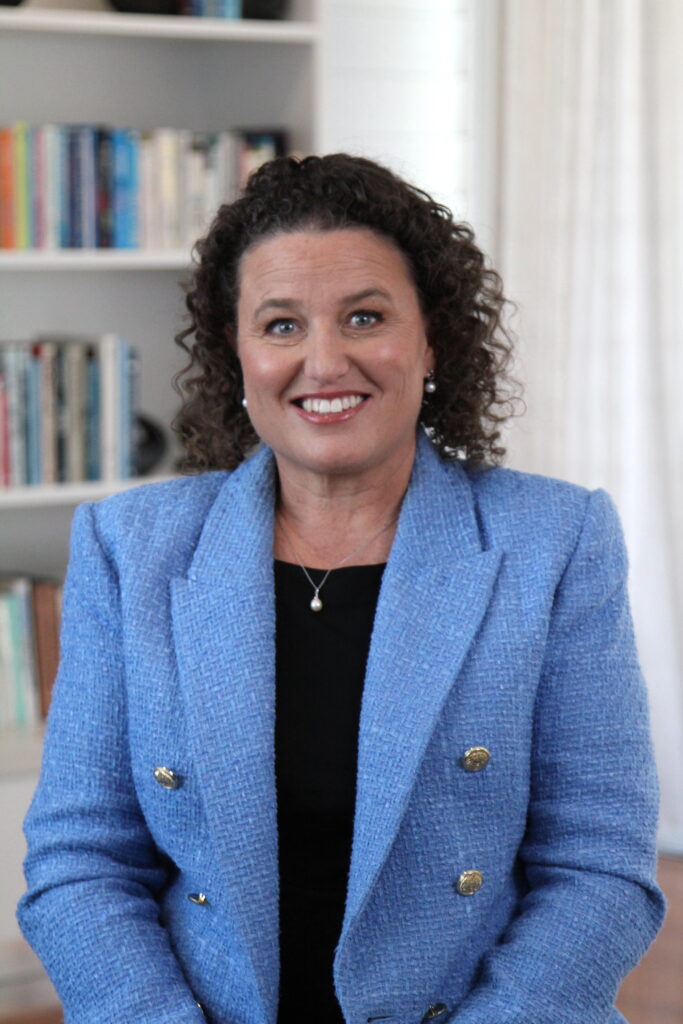
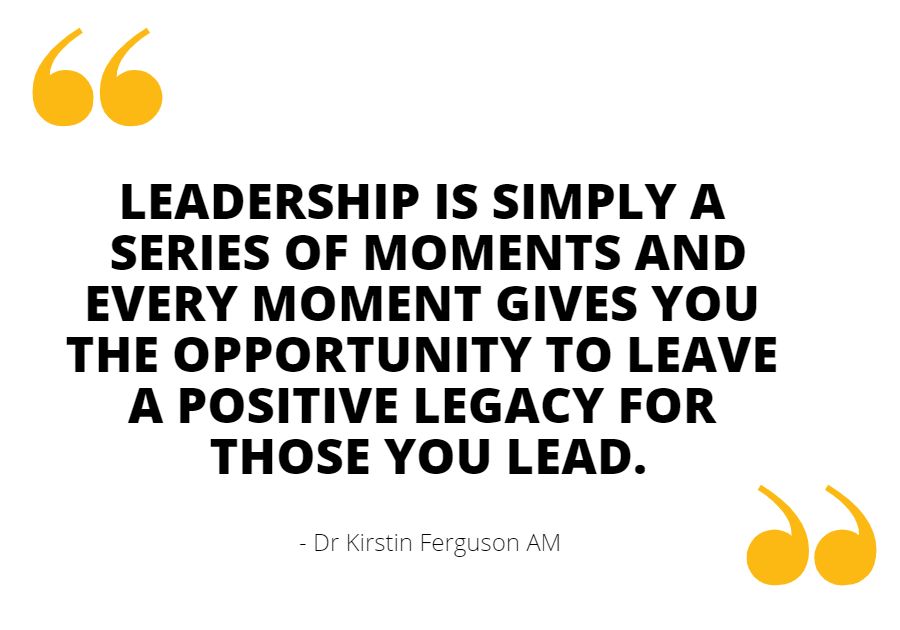
Roger Christie: I’m keen to unpack with you how digital itself can help leaders amplify their impact and legacy. So if I can start with a quote from your book, because I think it perfectly captures the opportunity for leaders today. You say, “leadership is simply a series of moments and every moment gives you the opportunity to leave a positive legacy for those you lead.”
What does that statement mean to you when we think about the role of digital or social media for leaders today?
Dr Kirstin Ferguson AM: I guess the first comment I want to make is that I don’t see a divide between digital and social and walking through an office to the Kitchen for lunch. Every footstep you take online, offline, whatever it is you’re doing, leaves an impact on others. And I think we’re long since passed thinking about it separately which is why I’m so amazed at the statistics in your report.
But I’m not surprised because I know there’s very few leaders that allow themselves that freedom to be themselves online but they allow themselves to be free in other parts of their life so to me it’s really curious.
I have just a small anecdote. About a decade ago, maybe 12 years ago, when I was just starting on boards I remember having a very senior company director come and chastise me. Basically, he warned me that being online would be the end of my director career. I had a momentary pause – ‘could he be right?’ – and then I just decided he was a dinosaur. And I was right, he was. I’m so glad I have just been myself online and offline for as long as I can think. It really makes a difference to your own leadership.
Dr Kirstin Ferguson AM: …Leadership is a series of moments. It can be the way you ask for something to be done. It can be whether or not you remember to say hello to someone. It can be online whether or not you like or comment – ‘congratulations’ – when someone shares an achievement. It might take five seconds for you to do, but you know that the person receiving it is going to be absolutely chuffed, especially if you’re their boss or their boss’s boss and you’ve taken the time to actually notice and support what they’re sharing.
Roger Christie: I think that’s really good – it can take as little as five seconds. This isn’t something where we’re asking people to add an extra day into their day. It’s simply about those little moments and knowing the impact that will have on people around you.
And if you can work through that, either if it’s uncertainty or if it’s lack of confidence, or if it’s fear, whatever the thing preventing progress is as a leader, if you can work through that and even just take those little five second steps, I think that is the best and most sensible thing you can possibly do.
Take five seconds to have an impact.
Dr Kirstin Ferguson AM: It really is. And I think what’s stopping people, there might be some fear, but for those really senior leaders, I think there’s a bit of arrogance that they shouldn’t have to go and write comments on that dirty thing of social media. There are some really old school views that, ‘What I had for breakfast isn’t going to be of interest to people.’
Or I’m going to say something that’s going to end up on the front page of the paper. All of those old tropes are a decade old now. There is no difference from doing it all hands at work and talking about what you’re proud of than going and doing a LinkedIn post and telling everyone what you’re proud of in your organisation.
I think for many people they now go and look online and see who their bosses are going to be and what they think about issues in the world. And if you don’t have a presence at all, it really says something about the kind of leader you are.
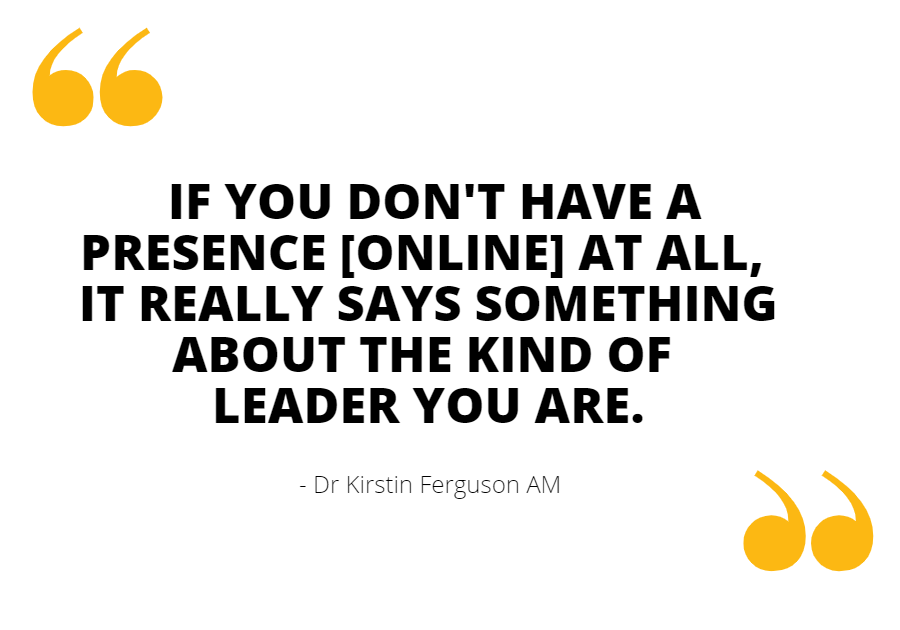
Dr Kirstin Ferguson AM: …We’re not suggesting that you go and share your views on contentious topics. Frankly, please don’t … but what you can do safely as a leader is talk about your team. Talk about someone who’s done something brilliant in your team. Talk about your organisation. You don’t have to get controversial, you don’t have to respond to news reports or something – just talk about the good stuff. So that would be my advice to anyone dipping their toe in the water – talk about the things you would talk about publicly or at a barbecue anyway, at a town hall or in front of your team. And it shocks me that people are still reluctant to do that.
And I think there is a fear of online and exactly what you said, there’s a long history. Get it wrong, and suddenly you will end up on the front page of the paper. But if you’re not saying anything [online] that you wouldn’t say publicly, then you really can’t go wrong. I’ve been really fortunate that that’s only ever been my rule. There’s a whole bunch of topics I just don’t comment on, because it’s not what I would necessarily talk about in front of a room of 300 people either. So if I’m not going to talk about it there, I’m certainly not going to talk about it online.
But every other topic, of which there’s endless, is perfectly safe! And there’s other like-minded people out there who love to talk about leadership or equality or inclusion or whatever it might be.
Roger Christie: Do you think it’s fair to say that one of the challenges that modern leaders have is a sense of clarity around what you’re going to talk about. And another factor we should bring in here is around the audience themselves and their expectations of what you will and won’t say and how you support interests as much as those close to their heart. Do you have any practical advice there around what to do when a leader faces an issue they don’t want to be drawn into but feel there’s an audience expectation that they should speak up and have an opinion?
Dr Kirstin Ferguson AM: That’s a whole other difficult topic – we saw this through the marriage equality debate with people like Alan Joyce. That was part of his personal brand and some people were thrilled with that. Other people were not at all, and that’s a personal decision.
Personally think he did a great job at raising that issue and many other organisations got behind the bandwagon. There’s other topics that companies will stay away from. You don’t see many CEOs talking about things like refugees or the catholic church, when that was particularly contentious. There’s some topics that no one’s gonna go near because it is so divisive.
For me, I’ve chosen topics that I am passionate about, gender equality, sexual harassment, marriage equality, trans rights. I think you decide what is a line in the sand for you. And if it was put on the front page of the paper that Kirsten Ferguson had done a tweet about marriage equality at the time, I would’ve been thrilled.
There’s a few internal tests you do, but not everyone will feel that comfortable. So to your question, I think it is more than appropriate for leaders to be able to draw a line and say, look, I’ve got personal views on this quite strongly, but I really want to focus on the organisation on what we as an organisation believe.
People on both sides of the argument in the organisation and I’m here for everyone. You know, I just don’t think any of this is rocket science. It is if you get it wrong and you decide you are going to go out on a limb on a really random right wing topic, but you know, no one’s going to do that! Who’s going to do that? So I think there’s a lot of fretting for no reason.
Roger Christie: I think a very practical way to try and solve that issue is not to be the source of authority on every single topic. It is okay, as you are saying, if there’s something that comes up that you don’t feel comfortable owning or that someone else within the organisation is far better place to do. This is the thinking and the merit behind the idea of a digital coalition; have people who do speak to different issues with different audiences. It doesn’t all have to come from the top of the tree.
Roger Christie: So going back to your book again, I think you make a pretty fair statement, but it is quite frank at the same time that ties this all together. You say that, ‘modern leaders put people at the center of that decision making and understanding that without an engaged, motivated, and purpose-led workforce, any business goals are likely to fail.’
For me, this beautifully describes the challenge and the opportunity around leadership in the digital age. We can rally people around us with greater scale and impact than we ever were able to before. But it does require leaders to think, who is listening, who is watching, how will this impact them and ideally, how will this motivate them?
And, and I know you talk about this at length in the book around this idea of flexible workplace policies and I also think that extends to leaders recognising their key audiences today are influenced heavily by what they say and do online or don’t say and do online. That’s where audiences are watching.
You can read more from Dr Kirstin Ferguson AM in her book, ‘Head & Heart: The Art of Modern Leadership’ available for purchase online and at all good book stores.
Feel free to drop Roger Christie a note with any thoughts – we’d love to hear from you – and be sure to subscribe to the Your Digital Reputation newsletter packed full of advice, trends and the best leadership examples just for you.
